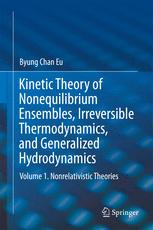

Most ebook files are in PDF format, so you can easily read them using various software such as Foxit Reader or directly on the Google Chrome browser.
Some ebook files are released by publishers in other formats such as .awz, .mobi, .epub, .fb2, etc. You may need to install specific software to read these formats on mobile/PC, such as Calibre.
Please read the tutorial at this link: https://ebookbell.com/faq
We offer FREE conversion to the popular formats you request; however, this may take some time. Therefore, right after payment, please email us, and we will try to provide the service as quickly as possible.
For some exceptional file formats or broken links (if any), please refrain from opening any disputes. Instead, email us first, and we will try to assist within a maximum of 6 hours.
EbookBell Team

4.4
22 reviewsThis book presents the fundamentals of irreversible thermodynamics for nonlinear transport processes in gases and liquids, as well as for generalized hydrodynamics extending the classical hydrodynamics of Navier, Stokes, Fourier, and Fick. Together with its companion volume on relativistic theories, it provides a comprehensive picture of the kinetic theory formulated from the viewpoint of nonequilibrium ensembles in both nonrelativistic and, in Vol. 2, relativistic contexts.
Theories of macroscopic irreversible processes must strictly conform to the thermodynamic laws at every step and in all approximations that enter their derivation from the mechanical principles. Upholding this as the inviolable tenet, the author develops theories of irreversible transport processes in fluids (gases or liquids) on the basis of irreversible kinetic equations satisfying the H theorem. They apply regardless of whether the processes are near to or far removed from equilibrium, or whether they are linear or nonlinear with respect to macroscopic fluxes or thermodynamic forces. Both irreversible Boltzmann and generalized Boltzmann equations are used for deriving theories of irreversible transport equations and generalized hydrodynamic equations, which rigorously conform to the tenet. All observables described by the so-formulated theories therefore also strictly obey the tenet.